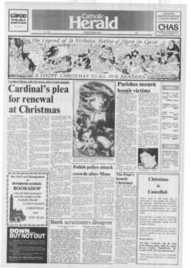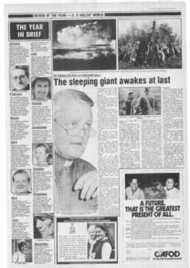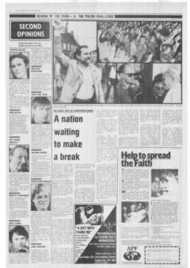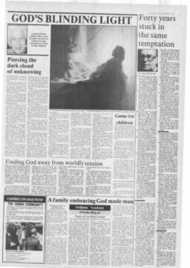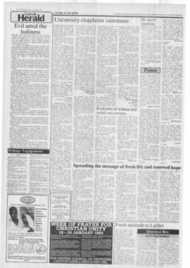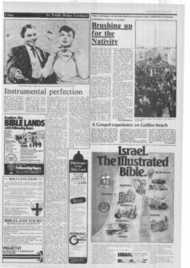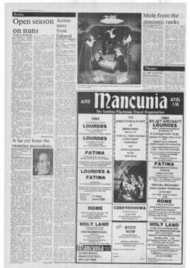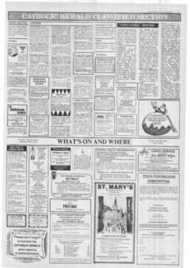Page 2, 23rd December 1983
Page 2

Report an error
Noticed an error on this page?If you've noticed an error in this article please click here to report it.
Tags
Share
Related articles
Pride Of Power
1984's Hurt Dream
Why Great Empires Are Always Hypocrites
Television And Radio
The Exemption Of • Our Hospitals
Charterhouse Chronicle
A hopeful lurch of the ecclesiastical machinery
ENGLAND in 1984, we can now be sure, will not be the grey world of doublethink and doublespeak, where every action is monitored by a brutal totalitarian regime, prophetised by George Orwell.
But some people have pointed out with relish that the Church in this country appears to be taking an ominous lurch towards centralisation with the launch on January I of the new structure of the Bishops' Conference of England and Wales, designed to bring the Conference agencies under more direct control.
In reality, however, the new machinery — the workings of which were revealed at this year's Low Week Bishops' Conference — is likely to provide more opportunity for consultation between the bishops and the various groupings within the Church.
Under the new system, the Commissions are to be released by a set of committees, each headed by a bishop, and a set of agencies, which will inform the Bishops' Conference on matters as diverse as youth and the apostolate of the sea. Another correlative block of bodies, representing such groups as the laity, will be able to make direct representations to the bishops.
In the middle of this complex sits the General Secretary, named at the November Bishops' Conference meeting as Fr Vincent Nichols, former head of Upholland Institute in Lancashire. He will be aided in his task by a General Secretariat.
Charges of "Big Brcither" tactics were also levelled at the Church over the Princess Michael of Kent affair. In July the Pope recognised the marriage of Prince and Princess Michael of Kent, five years after Pope Paul VI refused to grant a dispensation for it to take place.
No explanation of the decision was issued, in line with the Church's policy to respect the confidentiality • of those involved, royalty or not. But attempts to play down the validation of the couple's marriage seriously backfired, and the media had a field day, accusing the Church of double standards and underhand tactics.
Eventually, Cardinal Hume, who is becoming more and more expert in his handling of the press, issued a statement explaining the Church's position, and the matter died down. • A controversy that refused to go away quite so easily and will continue into next year, stemmed from the decision by Sir Keith Joseph, Minister of State for Education and Science, to axe initial teacher training at the Catholic De La Salle College in Manchester.
Sir Keith originally decided to end teacher training at Newman College, Birmingham and at De La Salle in 1982, but after strong representations from the bishops he reprieved Newman College, and deferred his decision on De La Salle.
But at the beginning of October, after a period when he had sent out signals that he had changed his mind, Sir Keith confirmed his original intention. In a letter to Bishop Thomas Holland of Salford, chairman of 1 he De La Salle governors, he said: "I cannot accept a claimed right to any imputable percentage of public sector training places. The contribution of the Catholic colleges must be subject to adjustment to take account of the changing policies of successive governments and the underlying developments in society and education."
With this statement Sir Keith dismissed the central plank of the so-called "historic share", which allows for a fixed percentage of teacher training places to go to Catholic colleges. Since then the debate has raged, and the Bishops' Conference last tcck stated that the College will einain open despite Sir Keith's decision.
Cardinal Hume's year has been particularly plagued by educational matters. Most parochial, or at least diocesan, was the highly critical Grubb
Institute report on the
Westminster Diocesan Education Commission.
The Institute, an independent research group, was commissioned by the diocese to prepare the report, but no-one suspected that it would reach such explosive conclusions, including that the Education Commission was "in disarray" and should be dissolved.
As a result of the report, the recommendations of which were approved by the Council for Diocesan Affairs, Bishop David Konstant, Bishop in Central London and chairman of the Commission, stepped down.
Reorganisation is now taking place under Mgr Ralph Brown, one of the Vicar Generals of the diocese.
On a less painful note, perhaps, was the recommendation by the Catholic Education Commission that Catholic schools should stop the practice of caning, and where it was continued, its use should be strictly governed.
The Commission decided to make its recommendations after they had considered the judgement of the European Court of Human Rights on the matter, which said that parents had the right to refuse to let their children be beaten. be resolved in the next month is the future of the National Catholic Radio and Television Centre at Hatch End, Middlesex.
As reported in the Catholic Herald in August, the centre — which is expensively equipped to provide Catholics with training courses in the media — is chronically underused, the staff morale low and many of the training techniques out of date.
One of the main problems has been the lack of leadership at the centre since the last director, Fr Michael Mitchell, resigned at the beginning of the year.
A recent meeting of the trustees appears to have produced no results, at least none that have been publically announced, but unless the bishops formulate a policy for the centre early in the new year it is likely to become an expensive white elephant.
Another story in the Catholic Herald, this time in January, also created a stir, but for different reasons. It concerned the findings of a report from the Laity Commission — now disbanded — which said that a chasm had opened up between the teachings of the Church and the beliefs of Catholic women in
England today. _
Women, the report claimed, felt themselves to be "inferior beings in the Catholic Church", and they felt that the 'Church's teaching on such issues as divorce, ordination and contraception was years out of date.
In fact the report was based on a very small survey of women, and the letter pages of the Catholic Herald were for some time overflowing with angry rhetoric directed at the Laity Commissions report.
The year ended with the outrageous IRA bomb attack outside Harrods in which five people were killed and 91 injured. The attack was immediately condemned by Church leaders in England and Ireland. Let us hope that it will not prove to be an ill omen for 1984.
blog comments powered by Disqus


